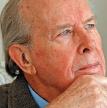Randolph Vigne (1928-2016): in memory
The first thing I noticed about Randolph Vigne, who has died aged 87, was his voice. It was fruity and rich and loud. Although South-African born, he spoke like an Englishman. He even looked like an Englishman. He frequently wore a bow tie and rode around London on a Dutch bike. It was easy to hear how he could be imperious or commanding but I cannot recall him ever being irritable or bad tempered.
I can't remember exactly where and when I met him, but it was in London in the 1980s. I had completed a SOAS PhD in African history; his interest was fixed on Namibia and he was a leading light in the Namibia Support Committee. He had formed a strong personal bond with Sam Nujoma, the leader of the South West African People's Organisation, whose biography he wrote many years after Namibian independence in 1990 and which unhappily remains unpublished.
I remember going to a reception at his grand terraced-row triple-storied flat in South Kensington and being surprised to meet Donald Woods on the top floor hogging the canapés. It must have been at the time Cry Freedom (1987), based on Woods' relationship with Steve Biko, was about to be released or had been released and Woods had become something of a celebrity. It was a gathering of South Africans and I can remember an acquaintance whispering to me: "this is the Liberal Party in exile".
I knew about Randolph's role in the Liberal Party - he was a party leader, he stood for parliament in the Gardens seat, and he was a member of the African Resistance Movement (his involvement was to shape the remainder of his life) - but he was very Catholic in his friendships.
I was puzzled though by his support for the PAC rather than the ANC. He was not so much opposed to the ANC as opposed to the SACP. He simply loathed Communism. He believed in individual freedoms and human rights for all. Communism was the complete denial of these freedoms. And the ANC was in an alliance with the SACP, hence partly his preference for the PAC. But he never held my Marxist world view against me.
My friendship with him began over the Southern African Review of Books. In the late 1980s I started the Southern African Review of Books and he introduced me to a number of writers - Lewis Nkosi, Arthur Maimane - who then wrote for the Review. In the 1960s he had run a small literary magazine called the New African and his knowledge of African literature and politics was vast.
The New African was a seed bed for the African Writers Series that his great friend, James Currey, edited at Heinemann publishers in the 1960s and 1970s, some 270 novels from some 25 African countries.
I tried to build a journal readership into a book publishing series but without success. Still Randolph believed in me and together we published A Gesture of Belonging (1991), Bessie Head's letters to him. He recognised her talent in Cape Town and supported her emotionally and financially in her Botswanan exile.
Where did his profound belief in liberal values come from? I'm not sure. The son of a Kimberley auctioneer, he was educated St. Andrews in Grahamstown and then at Oxford, returning to Cape Town in the 1950s to work for the publisher Masker Miller.
It took great courage and deep belief to risk his family and his life for his commitment to race equality. Like Braam Fisher he took the most dangerous of all stands against the values of the small elite to which he belonged.
He was solidly grounded in his family and this showed in the strength of his relationships most notably with his wife, Gillian. Dublin born, the daughter of an English army surgeon, she was always outspoken and often outrageous. Gillian didn't share all Randolph's ideas and beliefs but their relationship was the stronger for it.
I can remember attending their fifty-year wedding anniversary at the Gold Museum in Cape Town in 2003. It was a raucous gathering, outside in the open at the back, over which Gillian presided with gaiety and humour.
They had become swallows, nesting for the summer in an ordinary suburban bungalow in Fishhoek where Randolph took great joy in swimming at the beach, and flying back for the other summer to a flat in Deal in the south of England.
I also recall attending their sixty-year wedding anniversary at Alphen Hotel in Constantia, held inside a private room in the restaurant on a hot and sweaty evening in 2013. I forget who his best man was but his speech was as short as their marriage was long. The key to marital endurance, he said, quoting Ogden Nash: "Whenever you're wrong, admit it; Whenever you're right, shut up."
I'll miss his chatty emails with their antique inflection and dated tone: "We look forward to seeing you both -- 6.30ish. Kind thought about a bottle. Welcome but not necessary ..."
An educated man, a true friend, a great South African.
Rob Turrell is the founder of the Southern African Review of Books.

